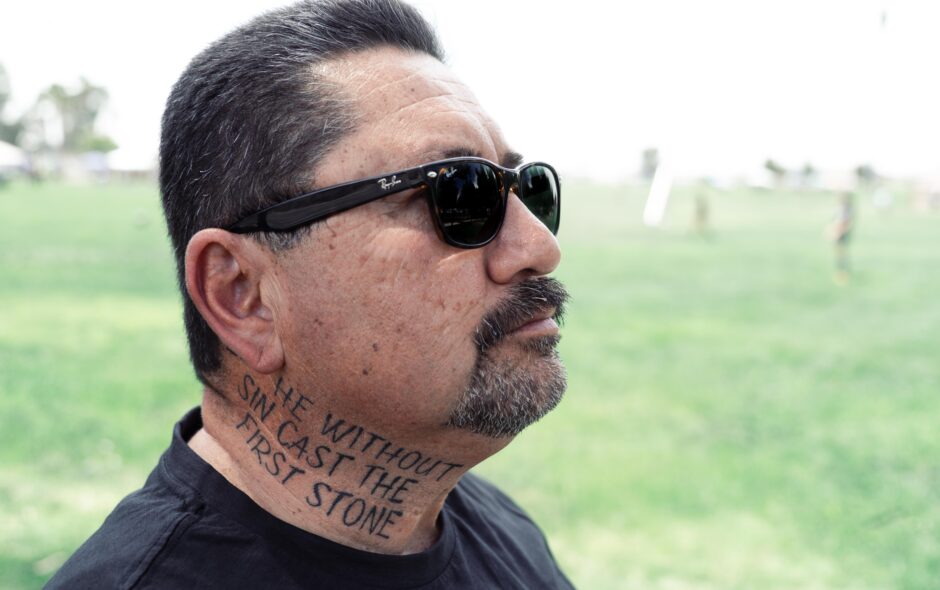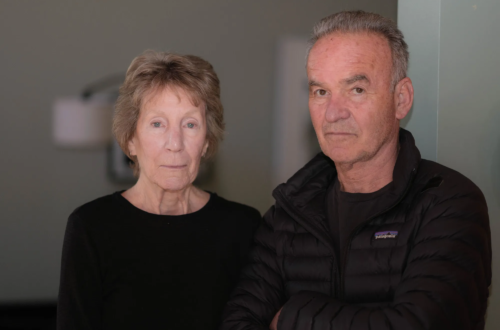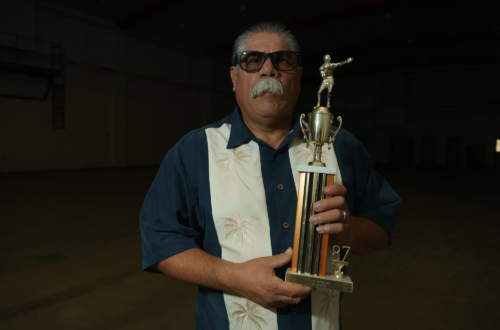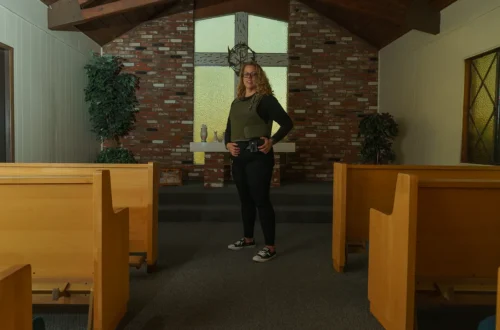Gladiator School: Stories from Inside YTS (Episode 3)
Edited and photographed by David William Reeve
Editor’s note: This is Part 3 of “Gladiator School: Stories from Inside YTS” — an oral history of life inside California’s most notorious juvenile prison. Youth Training School (known formally as Heman G. Stark Youth Correctional Facility) had a reputation for mayhem, violence and murder that earned it the name Gladiator School. It closed in 2010. Juveniles were hardened for survival at YTS, only to be returned to the streets.
Since publishing the story The Closing of California’s Most Violent Juvenile Prison, survivors of YTS have come forward to tell stories of daily life inside. This series relays and respects their stories: Juvie told by those who were there.
In this episode, Jeff (aka Huerito) is short timing when he leaves the comfort of Ventura Youth Correctional Facility to arrive at Fire Camp.
Remember what they taught us?
When you first go in, you have to know the rules and regulations, and there’s always somebody willing to give all the information. You see that the Blacks are in one section; the Whites and Chicanos are on one side. You can always tell who the ringleaders and shot callers are.
The Crips and Bloods were separated. Everybody from the Inland Empire got along. Everybody from Los Angeles got along. You didn’t talk to Blacks at all. Whites didn’t have gangs. The Whites — they were called Woods. They would put swastikas on, but there was no Aryan Brotherhood. The Nazi Lowriders were barely coming up. I had a lot of good friends who were Nazi Lowriders. But for the Chicanos, they were already in gangs.
I learned about chow, where to sit, and shower time. If the Blacks are on one side of the shower, then you don’t go in the shower at all. The Chicanos and the Whites take showers together; it’s 3-minute showers, you go in there, you get wet, you step out and start soaping up, and you don’t wash your hair. You never wash your hair because you’re vulnerable when your eyes are closed. You soap up — it takes 35, 45 seconds. You rinse off, and then you’re done. You don’t peter-gaze, you don’t do anything. Your eyes are focused straight ahead. You don’t do any of that stuff. Guys will do that. They like to flaunt themselves, and if you get caught peter-gazing, it’s rough for you. You always look up.
The murder that I committed was against some regular person. We were trying to steal his car. He was married and had a young child. He had fought with my homeboy so when he came at me — I just put out a knife and stabbed him. He died within a minute. I punctured his heart.

I grew up in a nice part San Bernardino. I never lived in the neighborhood. My Dad said, “you should never be involved in gangs,” even though he was an outlaw biker. I would take the city bus or ride my bike down to the neighborhood. I was a teenager, so I knew everything.
My Mom and Dad divorced in 1967. My Dad had a different girlfriend, raised a different family, but was always a part of my life. In 1978 my Mom and Dad reconciled and got back together. We were teenagers then. They bought a house and things were good. Eventually, my Brother went to the Army; my Sister was married.
On December 1, 1979, I was in a Christmas parade riding my lowrider bike; I came home and nobody was there. By Sunday morning, my Dad comes home barefoot. He had been arrested for beating my Mom. I didn’t see my Mom for six months.
So, it was just my Dad and me. We got really close. He would leave me money. My Dad had a good job. He made excellent money. I was one of the few of my friends that had a dad. Friends would come over. They knew we had food. We had meat. We had pizza. We had fish sticks.
By 1980, my Dad was working in Los Angeles and I had no supervision. I went straight into the street life and didn’t care about anything. I dropped out of school.

I was arrested for burglary and went to juvenile hall for the night. They put me on home probation and said I could no longer live with my Dad. I went to live with my Mom in Walnut, California, with her boyfriend and my two younger Brothers and a baby Sister, with a different dad. I sign up for continuation school and as we drive up, I see a bunch of Cholos standing in front of the school. I tell my Mom, “don’t even stop.” I’m gonna get jumped my first day here. I tell my Mom I’ll do good, but I want to stay with Dad. The courts figured I was still in Walnut, but I stayed with him.
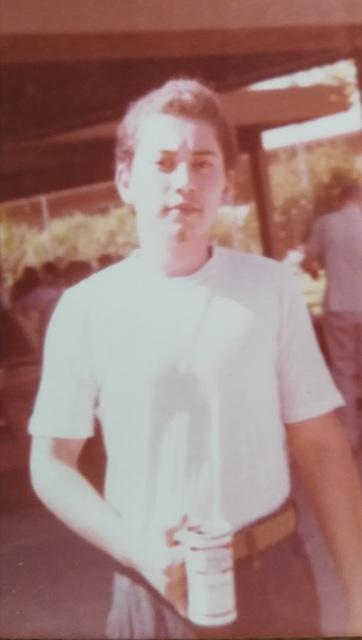
My Dad bought me anything I wanted. If I wanted to buy beer, I could go to the bar and put it on his tab. It became a party house. He told me whenever you’re drunk, but you still want to drink, pour your beer out and put water in it. We had a party later and I poured my beer out. I was sipping on water and then one of my homeboys says, “Let’s go. Let’s steal a car.”
My Dad came every weekend and every holiday. I knew my Dad was going to be there. He brought me pizza and soda; he and my Mom came — it was the first time they had been together in over a year. My Dad said, “Whatever you do, don’t kill yourself.” We had day passes and he would take me to the beach. My first week at YTS, I have a picture of my Dad who came to visit me. It helped me to see what life was like, even though everything had changed.




I “programmed”. I did what the California Youth Authority said I needed to do. My goal was not to kill anybody.
I heard about Fire Camp in 1984. I heard that if you’re in for murder, you can’t go. It made me very happy because that meant I could stay at Ventura.
In the morning, there’d be a piece of paper on your cell window. That means that person is shipping out to Fire Camp. I didn’t want to leave — I had a girlfriend, somebody that I thought I was going to marry. I figured I was going to parole from there.
I woke up one morning and saw that little paper in my window. They wereaccepting murders. My choice was either go to Fire Camp or get more time, and I didn’t want more time. I left with two other friends of mine who were in the same cottage in Ventura. We all road out together. I walked into that bus in shackles, chained up.
Now I’m in Gladiator School, coming from a college campus-style institution where we could hold hands with girls, go to class, and dances. It was the best place to do time. When I got transferred to YTS, I’m with nothing but men and everybody is sizing you up. You can’t show any fear.
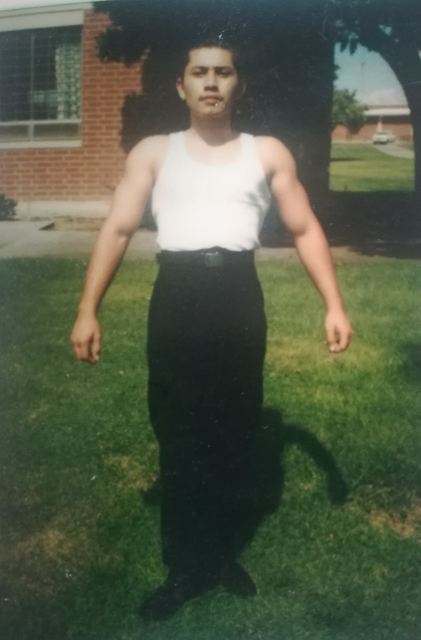
Fire Camp is run by the California Department of Forestry. It was a program at YTS in Units C and D. They train you to be a firefighter verified with the State. You go through CPR training and fire rescue training. They wanted to see us develop stamina. We had to run a lot. It’s like Boot Camp.
At Fire Camp, somebody stole my shoes and money, and nobody would admit to it. I had a meeting with all the Chicanos, but they didn’t admit to it. I had to confront the Blacks and the Whites. In the day room watching TV, this guy who had scars on his face from a box cutter, I said “When I give you the signal, turn off the TV” to get everyone’s attention. I made an announcement. Nobody said anything.
Nobody had any honor. There’s was no longer the honor that I grew up with in the institution.
Fire Camp was a whole different atmosphere. People were lenient. The rooms, the regulations; we were using the same bathroom stall as a Black guy. I’d never seen that before. Sharing stuff, talking, playing cards. I figured if nobody is going to follow the rules of an institution, I’m going to relax the rules, too. But in Fire Camp you’re not just with your race, now it’s a buddy system. You’re fighting fires with somebody who’s watching your back. I understood that, eventually.
We were fighting this fire near the Grapevine; it was really cold. We had been out for two days, going from one fire to the next. I was the drag shovel, meaning I was at the end of the line and I carried the medicine and the toilet paper in a backpack. Derrek — who was a Compton Crip — and I must have hiked five miles, and it’s two o’clock in the morning. We can see the glow of the fire down below. I thought I was going to freeze to death.

One of the things that they taught us in Fire Camp training was that if we’re in this situation and we share warmth with another person, we can survive. I looked at Derrek and asked, “Are you cold?” He’s chattering like I was. “Remember what they taught us?” I looked at him and he looked at me, and I didn’t even care. I said, “Come here, man.” Shoulder to shoulder we hugged each other — It worked. I couldn’t believe it. I wasn’t embarrassed. I wasn’t afraid. Why would I suffer out here? Because I wanted to be macho and do what the gang says? There were no rules. I didn’t suffer anymore because I saw the way that Fire Camp was run.

Jeff J., aka “Huerito” served three years and ten months in multiple juvenile facilities, including Ventura Juvenile Correctional Facility where in 1984 he was selected to transfer to Youth Trade School in Chino and serve his remaining time in Fire Camp. Jeff earned his high school diploma while incarcerated and once paroled, never returned. He has been married for 25 years and has raised six kids, including a son who became a LAPD officer. His father, known locally as “Mexican Bob” died in 2019.
David William Reeve is an independent writer and photographer who documents the lives of juveniles at risk. Visit davidreeve.net for more.
Contact: davidwilliamreeve (at) gmail (dot) com

